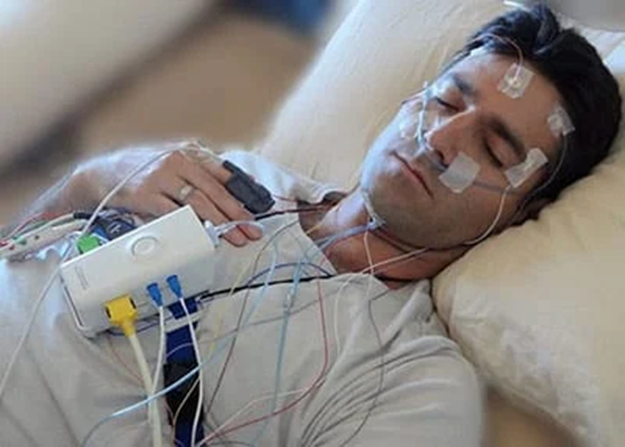What is a Polysomnography (PSG)?
•Polysomnography, also called a sleep study, is a comprehensive test used to diagnose sleep disorders.
•Polysomnography records your brain waves, sleep stages, the oxygen level in your blood, heart rate and breathing, snoring or other noises, your body position, as well as eye and leg movements during the study.
•Polysomnography monitors your sleep stages and cycles to identify if or when your sleep patterns are disrupted and why.
•In addition to helping diagnose sleep disorders, polysomnography may be used to help initiate or adjust your treatment plan if you've already been diagnosed with a sleep disorder.
WHO NEEDS A SLEEP STUDY?

•Snoring, gasping or if you stop breathing in your sleep
•Excessive daytime sleepiness and fatigue
•Narcolepsy (falling asleep often in the day, weakness caused by emotions, hallucinations during sleep time)
•Abnormal behaviours during sleep eg sleepwalking, acting out dreams
•Strange movements or restlessness during sleep
TYPES OF SLEEP STUDIES
What to expect?
What to expect?
•Continue to eat and take your medications as you normally would, and bring a list of these medications with you.
•If you are on any sleeping tablets please inform the technician so he/she can make a note of it.
•Bring some comfy pyjamas

Other FAQs
•Obstructive seep apnoea is when the tongue, palate or throat muscles block the airway during sleep causing you to stop breathing. This can lower the level of oxygen in your blood and cause a buildup of carbon dioxide.
•Your brain senses this impaired breathing and briefly arouses you from sleep so that you can reopen your airway. This awakening is usually so brief that you don't remember it.
•This pattern can repeat itself five to 30 times or more each hour, all night long. These disruptions impair your ability to reach the deep, restful phases of sleep, and you'll probably feel sleepy during your waking hours.
•People with obstructive sleep apnea might not be aware of their interrupted sleep. Many people with this type of sleep apnea don't realize they haven't slept well all night.
